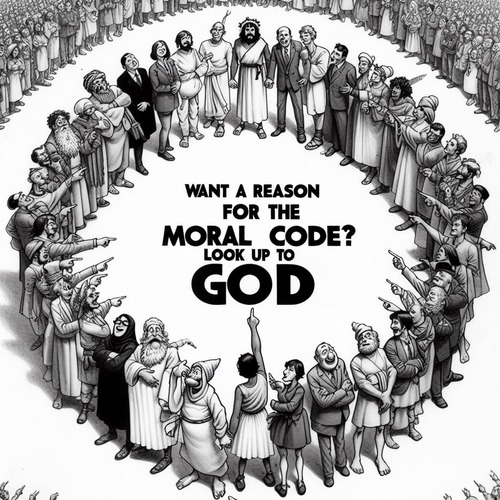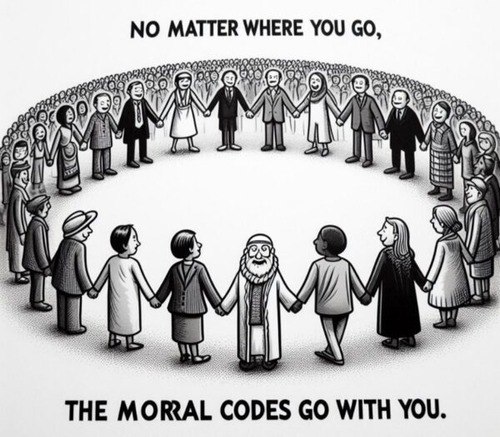Does God Exist? 10 Compelling Evidences
From the intricate design of the universe to the persistent longing for meaning in the human heart, the evidence for an intelligent Creator is all around us—if we have eyes to see…
Ten Compelling Arguments for the Existence of God
Consider these ten compelling reasons that weave a tapestry of thought, inviting us to consider the existence of a transcendent being
- The Finely-Tuned Universe Imagine trying to balance a pencil perfectly vertical on its tip. That's how finely calibrated the laws of physics had to be for life to exist in this universe. Scientists refer to it as the "fine-tuning" problem. Alter the force of gravity, the strong nuclear force holding atoms together, or any of dozens of fundamental numbers by even a tiny fraction, and the universe couldn't sustain life. It's like someone carefully dialled all the right settings. This incredible bio-friendliness has led some to propose an "anthropic principle"—that the universe seems engineered to inevitably give rise to not just life, but conscious life.
- Who Set Off the Big Bang? According to the Big Bang theory, the entire cosmos burst into existence from an infinitely small, ultra-hot, ultra-dense state around 13.8 billion years ago. This defies all conventional physics—it would be like throwing a few trillion lottery balls into the air and every single one landing perfectly together! Many scientists struggle to explain how this ultra-low entropy state arose without an intelligent Prime Mover behind it. So, in other words, if the cosmos erupted into being with the Big Bang, what—or Who—set off the bang? By definition, only something that was external to space, time, matter and energy could trigger and shape that originating singularity into this vast cosmos we inhabit. This points to a transcendent supernatural force.
- DNA's Hidden Code Within every cell, there are amazingly intricate DNA molecules—rather like an incredibly complex software program—encoded with precise instructions. Bill Gates has stated, "DNA is like a computer program, but far, far more advanced than any software we've ever created." Some scientists argue such information-rich codes scream of intelligent design behind life. SEE OUR POST: DNA Evidence for Intelligent Design: New Challenges for Evolution
- Irreducible Molecular Machines If you shrunk down and explored the micro-world inside a living cell, you'd encounter amazingly sophisticated molecular machines and transporters—like incredibly miniaturized factories or outboard motors—that seem meticulously and irreducibly designed. How could such incredibly complex machinery have emerged through an unguided natural process? SEE OUR POST: Irreducible Complexity: A Compelling Case for Intelligent Design
- The Astonishingly Precise Laws of Nature The existence of orderly laws of nature, which can be described mathematically, leads some to believe in a rational mind behind the universe. These laws are consistent and predictable, allowing scientists to understand and manipulate the natural world. What's more, the laws seem stubbornly universal, applying reliably throughout all of space and time from what we can observe. For instance, the laws, such as those of gravity, inertia and electromagnetism apply just as consistently in our solar system as across galaxies billions of light years away. This regularity and predictability suggest there is an underlying purpose and design, much like how a well-crafted machine operates according to specific principles set by its designer. This perspective sees the mathematical precision of the universe as evidence of an intelligent mind behind its creation
- The Mystery of Consciousness We have self-awareness and subjective, conscious experiences. But how could mere atoms arrange themselves in a particular way so as to give rise to an inner mental life, feeling, and self? Consciousness itself points to a deeper reality beyond just physical particles in motion.
- The Reason We Can Reason The fact we can reason and understand the world around us points to the existence of God. Our ability to think logically, solve problems, and uncover the laws of nature is remarkable. For example, we can predict solar eclipses, understand the structure of DNA, and even explore distant galaxies. This incredible capacity for reason and understanding suggests that our minds are not just random products of evolution but are designed for a purpose. Just as a computer's ability to process information points to the intelligence of its programmer, our capacity to reason is evidence of a higher intelligence, or God, who designed our minds to comprehend the universe.
- Evolution's Unsolved Mysteries While evolution explains some features of life, many biologists admit there are major unsolved puzzles. How did the very first life originate from non-life? How did fundamentally new anatomy and body plans emerge in complex organisms through undirected natural processes? The limitations of current evolutionary theory are like unsolved puzzles. How did the very first life originate from non-life? How did fundamentally new anatomy and body plans emerge in complex organisms through undirected natural processes? For some, the limitations of current evolutionary theory suggest an additional guiding intelligence was involved.
- The Argument from Beauty We don't just perceive the physical world—we also experience transcendent immaterial realities such as beauty, truth, justice, meaning and value. What would our lives be without these? Atheists struggle to ground these profound aspects of experience within a purely materialistic framework. Could these Platonic concepts be signposts to a deeper, broader spiritual reality underlying the physical universe.
- The God-Shaped Vacuum—The Argument from the Universal Inner Emptiness At the core of our beings, many of us sense an inexplicable emptiness—an aching void that nothing in this world seems able to fill. Blaise Pascal termed this the "God-shaped vacuum"—a universal longing that points to the reality of God, a void that's filled only when we do find Him in Christ. This profound sense of incompleteness plagues the human psyche until we find our Source and our purpose in the Divine. Strikingly, there seems no rational reason why any of us, let alone so many across cultures, should feel such an inner emptiness if we were merely products of matter, time and chance. This suggests we come pre-programmed with a longing for the transcendent, hinting at our divine origins.
Conclusion: Pondering the Evidence
When considering these 10 scientific reasons collectively, they make more than a compelling case for the existence of God, beyond reasonable doubt. From the extreme fine-tuning of the universe's laws to the origin of life's staggering complexity to consciousness arising from matter to the existence of abstract realities like mathematics and beauty—many of these phenomena transcend the limits of what science alone can definitively verify or explain away.
Ultimately, these indicators don't all fall squarely within the purview of empirical science, which relies on testing hypotheses through repeatable experiments and observations. Science has its methodological strengths, but also its boundaries in grappling with deepest existential questions of why the cosmos exists and whether a transcendent source undergirds reality itself.
There is undoubtedly so much more to life, consciousness, and the depths of existence than what the scientific methods alone can verify or falsify. While continuing scientific inquiry is important, these 10 reasons suggest that beyond the material world, there are profound signals of a higher reality, a universal intelligence, and a creator behind it all deserving of our faith, wonder and consideration.
Read More:
Editor's Pick

The Christian Sabbath: Why Did Sunday Replace Saturday?
Consider this: God-fearing Jews who’d faithfully observed Saturday Sabbath for over a thousand years suddenly began gathering for worship on [...]

Did the Early Christians Worship Jesus? The Biblical Evidence
It was a startling transformation: Jewish fishermen who'd spent three years following this itinerant carpenter from Nazareth now begin to [...]

If Jesus is Messiah, Why Aren’t ALL Messianic Prophecies Fulfilled?
If Jesus is truly the Messiah, why hasn't world peace arrived? Why do Jews still face persecution? Why isn't the [...]

When Courage Fails: Will I Be Forgiven If I Deny Christ in Persecution?
The rooster crowed, and Peter remembered. In that devastating moment, the apostle realised he’d just done the unthinkable—three times he’d [...]

What Makes a Godly Dad? 5 Biblical Principles Fathers Need
Modern culture sends fathers mixed messages. Be strong but sensitive. Be involved but not overbearing. Lead but don’t dominate. With [...]

What Makes a Godly Mom? A Scripture-Backed Guide
In our culture’s confusion about gender roles and parenting, the timeless question remains: what makes a godly mother? While secular [...]

Paul’s Mandate for Men: Headship Or Servant Leadership? Or Both?
Modern Christianity has fallen into a trap. We've created an either/or battle between "headship" and "servant leadership," as if these [...]

Should We Stop Using Male Pronouns for God? Why Do We Say No?
A friend of ours arrived eagerly at his first theology class in seminary. But he quickly discovered something troubling: the [...]

Did Old Testament Law Force Women to Marry their Rapists?
**Editor’s Note: This post is part of our series, ‘Satan’s Lies: Common Deceptions in the Church Today’… Viral misinformation abounds [...]

From Danvers To Nashville: Two Statements, One Biblical Vision
30 years separate the Danvers Statement on Biblical Manhood and Womanhood (1987) and the Nashville Statement on Human Sexuality (2017). [...]
SUPPORT US:
Feel the Holy Spirit's gentle nudge to partner with us?
Donate Online:
Account Name: TRUTHS TO DIE FOR FOUNDATION
Account Number: 10243565459
Bank IFSC: IDFB0043391
Bank Name: IDFC FIRST BANK






